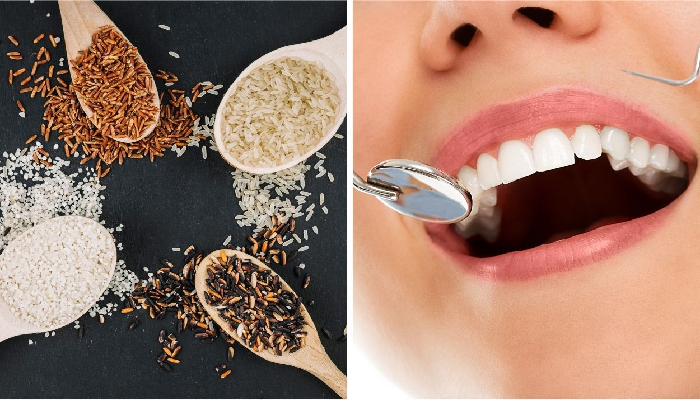Can I Eat Rice with Bitten Teeth

Can I Eat Rice with Bitten Teeth Eating easily and maintaining a healthy diet is very important for overall health. But what if dental problems like bitten teeth come in the way of your food choices? Bitten teeth, be it chipped, cracked or broken, can make you feel uncomfortable while eating certain foods and can even cause pain. Find out if you should eat rice with bitten teeth and how to plan your diet properly if you have this dental problem.
Dental health affects your ability to enjoy and process food. If teeth are compromised, you may experience discomfort, challenges with chewing, and risk of further damage. Knowing how to manage your diet in light of dental problems is important for the health of your mouth as well as your overall health.
Can I Eat Rice with Bitten Teeth
It is a metaphorical term used to refer to teeth that have been injured in one way or the other, for instance, being chipped, cracked and broken. The extent of this damage may range from a superficial chip of a tooth’s surface to a deep crack that compromises the structure of the tooth.
Causes of Bitten Teeth
Several factors can lead to bitten teeth, including:
- Trauma or Injury: Accidents or blows to the face can be the cause of chipped or cracked teeth.
- Biting Hard Objects: Chewing on hard foods such as ice or nuts can cause teeth damage by doing so.
- Tooth Decay: Having cavities in the teeth literally means that the structure of one’s tooth is being weakened, making it more prone to breaking.
- Grinding Teeth: Bruxism (teeth grinding) can wear teeth down over time.
Common Symptoms and Concerns
Bitten teeth can present various symptoms and concerns, such as:
- Pain or Sensitivity: You have pain while chewing or exposure to hot and cold.
- Sharp Edges: Jagged edges that can cut the tongue or cheeks.
- Aesthetic Concerns: Visible damage that hampers the beauty of your smile.
- Risk of Further Damage: Damage can be furthered if you do not respond in a timely fashion to the risk.
Nutritional Profile of Rice
Rice is a staple food for more than half of the world’s population, and the second-most important cereal crop in the developing world. It’s relatively low in protein compared to other cereals, but has a good balance of essential amino acids and high levels of vitamins and minerals. Rice is often referred to as a “perfect” food (and was the basis for suchhumorin the past);it’s rich in complex carbohydrates and extremely digestible.
Benefits of Consuming Rice
- Energy Source: Rice is composed of carbohydrate which is considered as the fuel for the body providing energy.
- Gluten-Free: Appropriate for gluten-intolerant people as well as those with celiac disease; that is the essence of it.
- Vitamins and Minerals: This is filled with key nutrients like B vitamins, iron and magnesium.
Types of Rice and Their Textures
Different types of rice have different textures and this plays a major role in determining how suitable it is for those with dental problems.
- White Rice: Soft and fluffy, easy to chew.
- Brown Rice: Chewy and fibrous, may take some getting used to in terms of texture.
- Basmati Rice: Long-grain with a light texture.
- Jasmine Rice: Fragrant and slightly sticky, soft texture.
- Arborio Rice: Short-grain, used in risotto, gets creamy.
Risks of Eating Rice with Bitten Teeth
Potential Discomfort During Eating
Eating rice of bitten teeth can be an uncomfortable situation especially if the rice is too chewy or needs more chewing effort. It creates extra sensitivity leading to pain.
Risk of Aggravating Existing Dental Issues
Eating hard or even chewy rice can make damage worse on a bitten tooth, and pieces of rice may become lodged in any cracks or chips which again will irritate the area and potentially move into the gum, causing infection.
Long-Term Effects on Dental Health
Ignoring the pain and continuing to eat rice without fixing your teeth can lead to long-term problems:
- Worsening Damage: Additional stress on the teeth that have been bit will cause a larger fracture or more severe crack.
- Infection: Decay-weakened teeth are more prone to bacterial invasion and hence it can lead to infection and this may necessitate extensive dental work.
Alternatives to Eating Rice
Soft Rice Options
Less aggressive rice dishes can be helpful in reducing the biting force on teeth:
- Arborio rice is used in ricotta while Kraft Parmesan cheese can also be added for more flavor.
- It is concentrated, nutritious, and easily digestible and the texture off requires little mastication.
Other Soft Food Alternatives
If rice is still a struggle, here are some soft foods to consider :
- Mashed Potatoes: Smooth and easy to consume.
- Oatmeal: is soft, nutritious , and good for a breakfast or as a snack.
- Scrambled Eggs: Soft and protein-rich.
- Soup: Blended soups are both easy on your teeth and can help you obtain essential nutrients.
Tips for Preparing Rice to Reduce Strain on Teeth
- Cook Thoroughly: Ensure rice is well-cooked and soft.
- Add Broth: Cooking rice in broth can thin it out and make it softer and more flavorful.
- Blend or Mash: If you have really bad dental problems, blending or mashing the rice can be good for you as well.
Care Tips for Bitten Teeth
Immediate Care and Management
If you have a bitten teeth here are some measures to take in controlling the condition :
- Avoid Hard Foods: Do not eat hard foods which require a lot of chewing.
- Use Dental Wax: Place dental wax on any sharp areas to protect your tongue and cheek.
- Rinse with Salt Water: Helps keep the area clean and decreases risk of infection.
Importance of Consulting a Dentist
Consulting a dentist is crucial for addressing bitten teeth:
Professional Assessment: This also helps in professional assessment. The dentist detects the intensity of the damage and recommends what needs to be done.
Restorative Procedures: You have the option of using bonding, which can be used to protect the part of the tooth that has been chipped. Crowns or veneers also can be an option to replacing the damaged portion of your tooth and also enhancing your appearance.
Preventive Advice: Your dentist can give you tips to avoid future damage and keep your oral health in check.
Preventive Measures for Future Dental Issues
Wear a Mouthguard: If you grind your teeth or play sports, make sure to protect your teeth.
Practice Good Oral Hygiene: Oral hygiene is indeed the first step towards healthy teeth and you can easily achieve this by brushing, flossing on regular basis and going for dental check-ups.
Avoid Hard Foods: Watch your eating habits and do not eat foods that can chip or break teeth.
Conclusion
Eating rice with half-bitten teeth is not so easy. But it does not mean that you will give up eating this staple food. Take precautions and preventive steps so that your dental health remains fine and other problems also do not crop up.
It is important that you give priority to your dental health while choosing your diet. You should prefer soft foods as well as consult your dentist to treat any kind of tooth problem at an early stage. You can have a healthy diet without effecting your dental health by taking these precautions.



